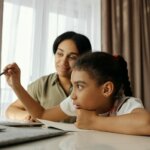PARENTING IN THE AGE OF SCREENS
3-minute read.
If you’re a parent, you are surely no stranger to the conversation surrounding screen time. You may even already be aware that American children spend between 4 to 8 hours on screens per day. And that’s based on findings conducted before the pandemic!
The introduction of distance learning into schools across the country last year saw those numbers jump even higher. And while fully remote or hybrid learning may be less of a concern going into the 2021-22 school year, this issue remains as prevalent as ever and one that should not be ignored.
The effects of excessive screen time on our children’s well-being.
Unbridled screen use can have a serious impact on our future leaders’ still developing brains. It can decrease stamina and focus; exacerbate anxiety, depression, stress, and sadness; and lead to more frequent emotional meltdowns. Some early signs of these changes might manifest as your child having trouble sleeping, eating more, and engaging in less physical activity. It is important to monitor this kind of behavior, so you may pick up on—and ease—more serious mental distress.
In terms of academic performance, the prognosis is also less than ideal. A 2018 National Institutes of Health study found that children who spent more than two hours a day using screens scored lower on language and thinking tests. Beyond that, some children with over seven hours a day of screen time experienced thinning of the brain’s cortex, which is the area related to critical thinking and reasoning.
Among our very own students, we have witnessed many regress in writing skills such as remembering basic spelling, punctuation, and capitalization over the last year and a half. And many more have struggled with critical thinking and applying learning outside of the classroom.
Is the situation really so dire?
The above holding true, it is important to look at this issue from all sides. Screens are not all bad and have, in fact, improved many areas of our lives…including our academics! Our students live in an age in which information on endless topics is at their fingertips. Writing a research paper, learning a new instrument or skill, creating a presentation…all of these things and more have been revolutionized by technology and screens.
While on one hand screens can work against a child’s mental state, on the other they can provide a safety net. When considering the pandemic we’ve all just lived through, no one can deny the power of screens to keep us connected to our communities. Really, what price could you put on the ability to FaceTime grandma and speak with her whenever you’d like?!
We are living through a massive cultural shift, one that is pushed forward and depends on screens. These tiny marvels of engineering have become a non-negotiable part of our society…so remember to cut yourself a bit of slack!
What can be done to lessen the negative impact of screen use?
As parents and educators, we still want to do everything we can to mitigate the detriments caused by extreme screen use. Check back next month for Part 2 of our two-part Screen Time series, in which we will provide some practical tips to help parents like you manage their child’s screen usage!
Tutoring Club of McLean’s award-winning method incorporates learning techniques both on and off of screens. And we pride ourselves on making learning fun so that our students stay engaged in their academics, no matter the time of year! Contact us today to see how we might fit into your child’s summer schedule.
Michelle Scott
Owner/Director
Tutoring Club of McLean
703.237.TUTOR (8886)
Email: McLeanVA@tutoringclub.com



Comments